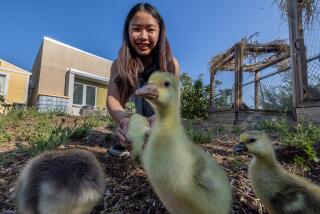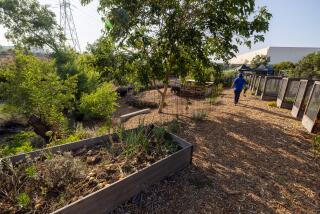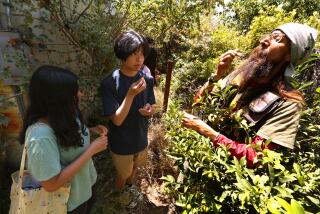Students Gather Trash, Gain Insight in Canyon
SUNLAND — Half the ragtag group that traipsed along Big Tujunga Wash were the kind of students that parents brag about on bumper stickers. The rest were the unsung strugglers. But they came together Thursday for a hands-on lesson in ecology, cooperation and hard work.
“Teachers will always take the honor students out,” said Reseda High School science instructor Tony Recalde. “What about the regular kids? These are the kids we want to make a difference with.”
Recalde paired ninth-grade honor students with 11th-graders whose records are less stellar, and headed out into a canyon just half a mile east of the city limits and a world away from the asphalt sprawl those students know best.
There, amid the granite and gneiss boulders, stood Angel Arrequin, a 16-year-old who says he’s starting to pull away from a rough crowd in his Northridge neighborhood.
“Yeah, this is great, man,” said Arrequin. “I’m glad our teacher brought us here. I didn’t think it was going to be like this. This is nice.”
Arrequin was breaking up a rock dam that not only slowed the flow of the Big Tujunga Wash, but also attracted the swimmers whose diapers, charcoal and polystyrene plates littered the creek side.
Recalde, 32, whose maverick teaching style draws open admiration from his young charges, said the exercise was “more of a training process than one class. Missing one day isn’t going to kill them.”
Bringing those 58 students out to see what the textbooks call an alluvial fan or a flood plain wasn’t easy. Recalde gathered funds from the nonprofit California Environmental Project and a UCLA environmental science program called ISSUES to make the trip.
By midday, the students had piled dozens of bags of trash by the roadside, along with box springs, a baby stroller, a crushed barrel and a six-foot long empty propane tank.
Most of them could recite at least part of what Recalde had lectured about.
“It was all formed by water,” explained 16-year-old JoAnna James, an 11th-grader from Tarzana. “The earthquakes made the cracks and the water did the rest.”
Xiutleth Santivanez--his friends just call him “Chicle”--has a Mayan name that means “the king of the blue fire.” On Thursday, the 16-year-old was a happy king of the plastic trash bag, lugging it over sand, boulders and trees.
“Before, I seen people like my friends throw trash,” he said. “I thought someone came out and picked it up, you know, someone got paid to do it. Now I see it’s all voluntary. You see how it blocks up the water and all. . . . We found boxers, socks, shoes, lots of smelly diapers.”
As early afternoon shadows crept across the canyon, Santivanez and his cohorts lugged the product of their toils back to the bus parked on Big Tujunga Canyon Road. They also carried with them a few lessons beyond the earth-science syllabus.
“He taught us trust,” said James. “He got in our face. He said, ‘I’m counting on you. I trust you.’ He told us when the bus was leaving and to be there on time. He didn’t say it in a mean way, or yell at us. He wasn’t like your parents or anything. He trusts us.”
More to Read
Sign up for Essential California
The most important California stories and recommendations in your inbox every morning.
You may occasionally receive promotional content from the Los Angeles Times.











